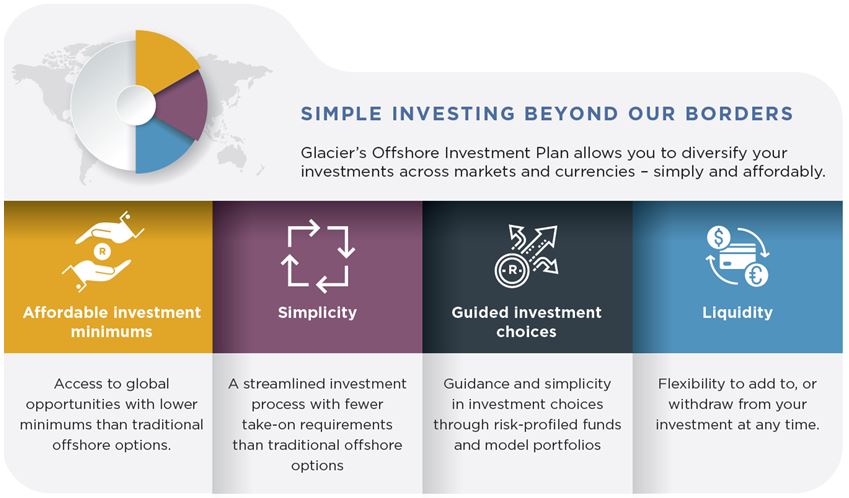Recognizing the Relevance of Spending Off Coast for Wide Range Diversification
Offshore investing plays a substantial duty in wealth diversification. It enables people to touch into a broader variety of worldwide markets and financial investment possibilities - Investing Off Shore. This method can successfully minimize threats connected to domestic financial uncertainties. Additionally, overseas financial investments might supply governing and tax benefits. Nevertheless, several stay unaware of the nuances and intricacies involved. Understanding these aspects is essential for anyone considering this method for their monetary future. What factors should one consider before taking the plunge?
The Principle of Offshore Spending
Offshore investing refers to the practice of putting properties in monetary markets outside one's home nation, typically to attain better financial safety and security and diversity. This technique permits companies and people to access different global markets, potentially taking advantage of different economic climates, currency worths, and investment opportunities. Investors may pick offshore accounts for reasons such as regulatory benefits, tax obligation advantages, or personal privacy protection.The idea incorporates a series of financial investment vehicles, including stocks, bonds, real estate, and mutual funds, offered with international monetary institutions. Furthermore, overseas investing can help alleviate risks connected with domestic market variations. By spreading out investments internationally, people can potentially safeguard their wide range versus political or financial instability within their home country. Generally, offshore spending functions as a strategic strategy to enhance financial portfolios, supplying access to a broader array of assets and chances past regional markets.
Benefits of Expanding Your Investment Profile

Risk Mitigation Techniques
How can financiers properly handle risk while maximizing returns? One crucial technique is asset allotment, which involves dispersing financial investments across numerous property classes to reduce exposure to any kind of solitary danger. Financiers can expand geographically by including overseas possessions, which typically act in different ways than domestic financial investments, thereby decreasing general portfolio volatility. In addition, incorporating different investments, such as property or assets, can offer additional risk reduction. Regularly rebalancing the profile assures that property allocations stay straightened with risk tolerance and financial investment objectives. Understanding market patterns and economic signs can assist capitalists anticipate modifications and readjust their portfolios as necessary. Ultimately, a well-structured financial investment approach stresses diversification, intending to stabilize potential returns with appropriate degrees of threat.
Money Diversification Benefits
Financiers that integrate currency diversification into their portfolios can improve their capacity for returns while lowering direct exposure to local financial fluctuations. By holding possessions in numerous money, they can maximize beneficial exchange rate movements and minimize losses from currency devaluation in their home market. This method not just spreads out threat but additionally opens methods for financial investment in emerging markets, which may provide greater growth possibility. In addition, currency diversity can serve as a hedge against rising cost of living and political instability, giving a buffer during financial downturns. Generally, this technique advertises a more resistant investment profile, enabling financiers to navigate worldwide markets with greater adaptability and self-confidence, ultimately resulting in improved long-term financial security.
Decreasing Threat Via Geographic Diversity
Geographic diversity provides substantial benefits by spreading out financial investments across different areas and markets. This method aids lessen dangers linked with economic instability, as declines in one location may be countered by development in another. Additionally, buying arising markets can provide distinct possibilities for higher returns and additionally boost profile resilience.
Advantages of Geographic Diversification
Why should one take into consideration geographical diversification as a technique for risk reduction? Geographic diversity permits capitalists to spread their properties across various countries and regions, mitigating the influence of localized economic recessions. By purchasing several markets, one can take advantage of various development cycles, money activities, and market dynamics. This method reduces dependancy on a single economic climate, which can be vulnerable to political instability or natural calamities. Additionally, geographical diversification can enhance portfolio performance by tapping into arising markets with high growth possibility. It offers a barrier versus rising cost of living rates that may differ by region, making sure that the general value of investments continues to be stable. Ultimately, geographical diversification is a sensible approach for protecting wealth against uncertain international events.
Decreasing Financial Instability Threats

Economic instability can posture substantial risks to investment portfolios, making it important to embrace techniques that alleviate these threats. One efficient approach is geographical diversity, which entails spreading out financial investments across various areas and countries. By alloting possessions in various economic atmospheres, financiers can decrease their exposure to localized economic slumps. If one country faces an economic downturn, financial investments in various other regions might continue to be secure or even flourish, offering a barrier versus possible losses. Additionally, purchasing numerous money can further protect against money changes and rising cost of living risks. On the whole, decreasing financial instability threats with geographic diversification not only improves durability however likewise placements capitalists to seize chances in numerous markets, inevitably promoting long-lasting economic security.
Purchasing Emerging Markets
Spending in arising markets offers a tactical method for lowering danger via geographical diversity. These markets, commonly identified by quick growth and advancing economic landscapes, can give special possibilities that are less correlated with developed markets. By assigning resources to nations with broadening and blossoming sectors look at here now customer bases, capitalists can alleviate the influence of localized financial slumps. Furthermore, emerging markets might exhibit higher development capacity, enabling investors to maximize positive market fads and increasing global demand. Nevertheless, it is vital to acknowledge the integral threats, consisting of political instability and money fluctuations (Investing Off Shore). A well-researched and well balanced approach permits financiers to harness the advantages of emerging markets while effectively managing prospective downsides, inevitably enhancing their overall portfolio resilience
Accessing Arising Markets and Opportunities
As global markets advance, accessing emerging markets presents an engaging avenue for riches diversification. These markets usually show rapid development possibility, driven by boosting consumer need and technological innovations. Financiers can use markets such as technology, renewable power, and infrastructure, which are crucial in driving financial growth in these regions.Strategically investing in arising markets permits capitalists to take advantage of on desirable demographics and increasing middle-class populaces. This creates unique chances for organizations to flourish and, as a result, for financiers to take advantage of substantial returns. Furthermore, emerging markets frequently exhibit reduced correlations with industrialized markets, providing a buffer against volatility.To effectively gain access to these possibilities, investors can use various vehicles, consisting of exchange-traded funds (ETFs), shared funds, and direct equity investments. By diversifying their profiles via emerging markets, investors can boost their overall risk-adjusted returns while placing themselves advantageously in a frequently transforming international landscape.
Money Defense and Hedging Techniques

Lawful Considerations and Conformity in Offshore Spending
Guiding with the intricacies of offshore investing calls for an eager understanding of the legal landscape and conformity requirements that differ by jurisdiction. Investors should completely recognize guidelines worrying foreign investments, tax, and reporting commitments to assure compliance with both worldwide and local laws. Many nations have particular legislations governing the establishment of offshore accounts and entities, which can include rigid Know Your Client (KYC) and Anti-Money Laundering (AML) regulations.Furthermore, financiers must be careful about possible lawful risks, including tax obligation evasion or inadvertent infractions of safety and securities regulations. Involving with respectable lawful professionals or monetary experts acquainted with offshore laws is crucial to navigate these complexities. In addition, remaining informed concerning adjustments in laws and policies is important, as non-compliance can bring about extreme fines. Eventually, a thorough understanding of lawful considerations assurances that offshore financial investments add positively to wide range diversity without sustaining lawful repercussions.
Actions to Get Going With Offshore Investments
Many financiers seeking to expand their riches might find the procedure of starting overseas financial investments both satisfying and difficult. The first step involves comprehensive study to recognize suitable overseas jurisdictions that line up with financial investment objectives and provide positive regulations. Following this, investors must choose a trusted financial organization or investment company experienced in overseas financial investments. Opening up an offshore account is important, necessitating the entry of personal identification and compliance documents.Next, investors ought to examine different financial investment options, such as realty, common funds, or supplies, seeing to it they line up with risk resistance and economic goals. Consulting with monetary advisors or legal experts can provide valuable insights right into the complexities of overseas investments. Normal monitoring and re-evaluation of the investment portfolio are essential to adapt to market changes and assure peak performance. By complying with these steps, investors can successfully navigate the offshore financial investment landscape.
Often Asked Inquiries
What Kinds of Possessions Can I Buy Offshore?
The existing question explores different overseas investment alternatives. People can think about possessions such as genuine estate, common funds, supplies, bonds, rare-earth elements, and cryptocurrencies, each offering unique advantages relying on individual monetary goals and take the chance of resistance.
Are There Minimum Investment Amounts for Offshore Accounts?
Minimum financial investment amounts for offshore accounts differ significantly depending upon the organization and sort of account. Some call for just a few thousand bucks, while others might stipulate greater thresholds for costs solutions and financial investment opportunities.
Just How Do Taxes Work With Offshore Investments?
Taxes on offshore financial investments vary by territory and the investor's home country. Usually, income produced might be subject to taxes locally, while some countries might use tax rewards or exceptions for particular overseas accounts.
Can I Take Care Of Offshore Investments From Another Location?
Taking care of offshore investments remotely is undoubtedly possible. Numerous banks offer on the internet platforms, allowing financiers to keep track of and negotiate seamlessly from anywhere, provided they abide by regulatory demands and comprehend the connected dangers and costs.
What Prevail Misconceptions Concerning Offshore Spending?
Usual misunderstandings about overseas investing consist of the belief that it is exclusively for the affluent, inherently prohibited, or overly complicated. In truth, it can be easily accessible, legal, and manageable for straight from the source various capitalists seeking diversification. By spreading financial investments across different property classes and geographical regions, investors can safeguard themselves versus market volatility and currency fluctuations. Geographic diversity uses significant advantages by spreading out investments across different regions and markets. Furthermore, arising markets often display reduced correlations with developed markets, using a buffer versus volatility.To efficiently accessibility these opportunities, investors can make use of numerous cars, consisting of exchange-traded funds (ETFs), common funds, and straight equity financial investments. Following this, investors need to pick a credible monetary organization or investment company experienced in offshore financial investments. Regular surveillance and re-evaluation of the financial investment portfolio are vital to adapt to market modifications and guarantee peak performance.